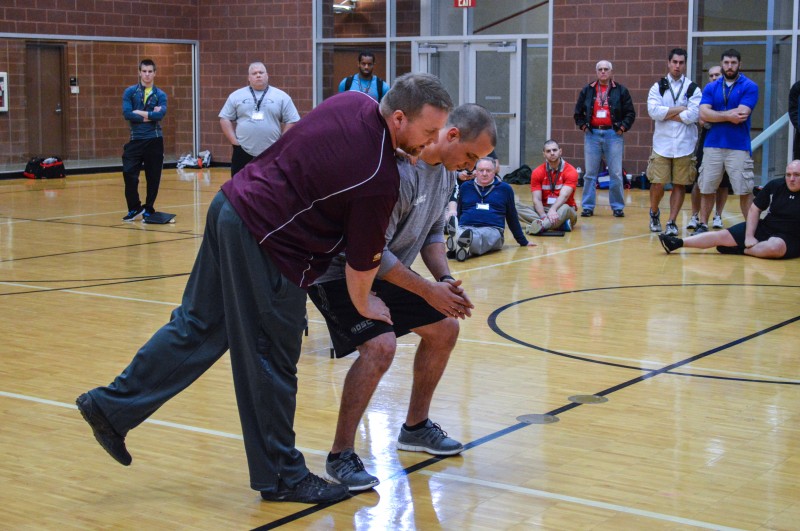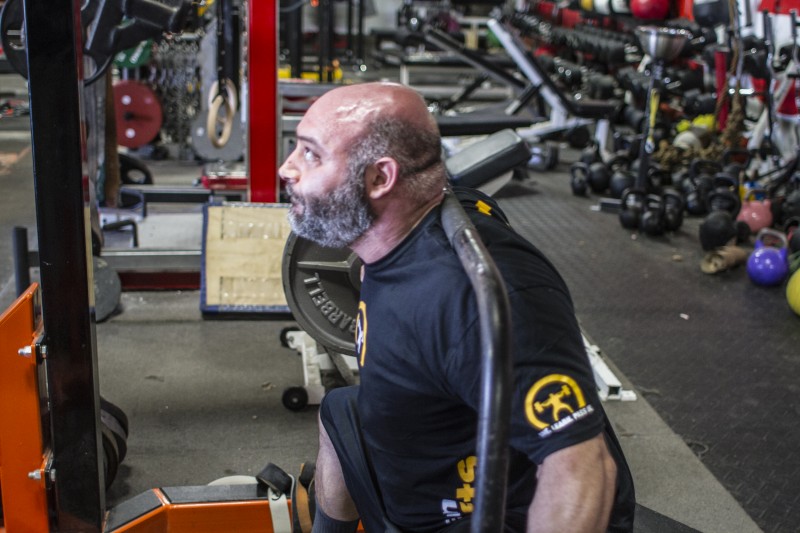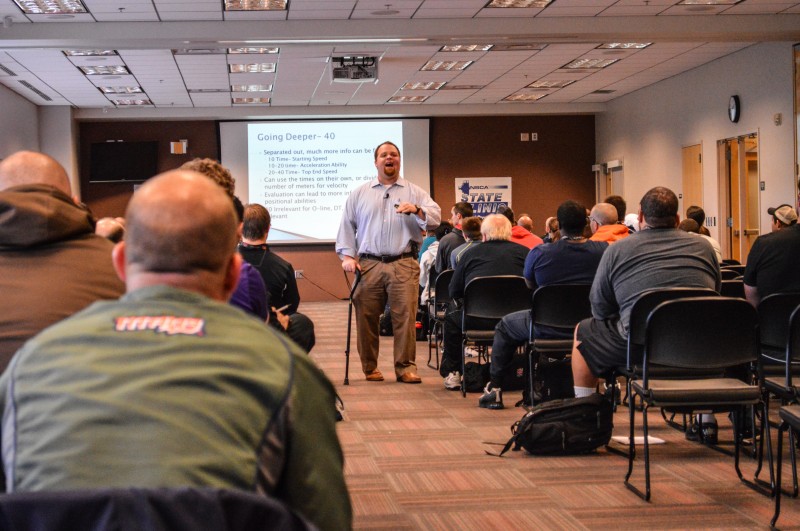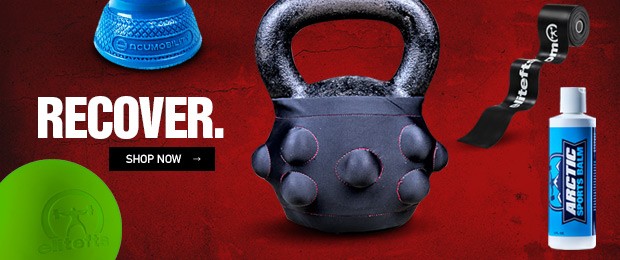
A lot has changed as a result of social media in strength and conditioning. In some ways, we have grown and in some ways, we have regressed. Now, as a result of having however many people I follow as a search engine, I keep coming across these great new articles. Many of these articles give me great insight into a small aspect of something, whether it be a new metric to look at athletes with an isometric mid-thigh pull, a new twist on an old exercise, or maybe just reminding me of something that is solid gold that I forgot about 10 years ago. In this way, the era of social media is great.
RECENT: The Power of the Parable: Thomas Edison
However, it kills some things. Since we are inundated with information, many of the younger coaches feel that they know it all, as they've read about it. They don't need to experience something because they've read all of these articles on it. I liken this to a classic movie (classic to me at least), Good Will Hunting. For those who haven't seen it (shame on you, it's on Netflix so watch it today), Will is an absolute genius who is so well read and intelligent that he's an absolute genius on every topic. He has a troubled past that he has to deal with and sees counselors, who he frustrates to no end. One counselor is a character played by Robin Williams.
Will Hunting is getting under Robin's characters skin, and he loses it. Will thinks he's off of the hook and doesn't have to go back to therapy, but then is surprised when Robin Williams asks to see him again and does so at a park. Robin Williams says, "You're just a kid. You've never done anything. You don't know what it smells like inside the Sistine Chapel." He said a lot of things, but this is what really stuck with me. You can read and learn about all of these things, but until you've lived them, you don't know what it's like. You don't understand where the author is coming from until you've had those experiences.
There is no room for an article when experience is called for. You can read all day long, but when you get on the hot spot, you'd better know how to respond. From a personal example, I have recently transitioned away from full-time coaching, as many of you know. I did this not because I don't love coaching or strength and conditioning, but because it allows me to do other things to aid others in strength and conditioning. One of these is aiding other coaches at Mizzou in researching our athletes. Our head wrestling coach put me on the spot and asked me some tough questions about the isometric mid-thigh pull test that we were doing and what it would be good for. I have read many articles, so the information isn't an issue. I have been through 19 years worth of experience at the college level, so being put on the spot wasn't an issue. In fact, I didn't think anything of it. It wasn't until when a lab assistant said, "Damn, I'm glad he didn't grill me like that" did I realize what had happened. I had been through that fire before, and I knew what to do and what to expect and how to respond. If he were to question my assistant, while he was quite capable of knowing the information as he had read the same papers and done the test just as many times, he most likely would have sat there stuttering.
Another area that I think social media has robbed us of is the visiting that used to go on with everyone in strength and conditioning. During my first position under Rick Perry, spring break didn't mean partying and having a good time — it meant going on the road and visiting other people in their weight room. The experiences we had were invaluable. I remember one year when we went to visit Westside Barbell and the Cleveland Browns when Buddy Morris was there. I had read many articles on Westside Barbell that Louie Simmons had put into the now defunct "Powerlifting USA."
I knew the info, I had read his articles, and I had read any of the books he cited. Being in the environment, though, gave me an entirely new perspective. I had read about the way they did dynamic effort by allowing the barbell to free fall and attempting to reverse it one inch off of the chest, but I had never done it correctly. I thought I had for about two years, but learned quite quickly that I had not. When I did it correctly, the experience was completely different in my musculature than it had been for the previous two years of doing it every week in my training.

I thought I knew what the reverse hyper was and how to do it until I did it with Louie. I thought I knew and understood concurrent periodization with athletes until I watched Buddy Morris and Tom Myslinski take groups through for three days. I read the articles but saw how completely different the information was first hand then what I had read. Being there, immersed, gave me a viewpoint far different than anything I had read. The information was the same, but the interpretation was completely different. What I thought was correct was maybe half right. Seeing it in action and experiencing it changed the way I coached and trained athletes. I can tell you something else: if you have watched the Tunch Punch video about how to strike as offensive linemen, you get something out of it. But when you have someone who performed it for years in the NFL teaching you what to do and how to do it, you gain completely different insight. They can tell you why you should hold your hands slightly different from their experience, or get you to feel the punch from the scapula rather than driven from the chest.
Back in the spring, I had the fortune of speaking at the NSCA Tactical Strength and Conditioning Conference in San Diego. While I am geographically challenged, I did realize that Escondido was 20 minutes from near Qualcomm Stadium and I took a chance and reached out to Dr. Michael Yessis. Over the course of a day, myself and a colleague from the NSCA were run through the ringer by Dr. Yessis, where we learned how to look at film and the basis of his specialized exercises. While I had read the books, I didn't always know what they meant, although I was certain I understood. I had complete misconceptions about the way many of his exercises that I thought were stupid were performed, and have since returned to put them into my own training sessions and preach their value to those who will listen.
I still love squat, bench, deadlift, clean, and the other basic lifts. I still see the need for strength, but I also see the impact of focusing on developing one specific aspect for training. If I didn't take a day to spend with Dr. Yessis, I would never have had this change of insight. What really changed for me? The realization or the further reinforcement in my mind that training just to improve a lift is futile if it doesn't also improve performance. Improvement in general exercises causes a great improvement to qualities involved in sport for lesser-prepared individuals. Those improvements quickly die off and you need something else to do to continue to improve. If you're trying to get faster, it is absolutely true that getting stronger legs through squatting will improve your sprinting ability, particularly if you are younger, weaker, or untrained in general. However, once you get up to around a double bodyweight squat, the transfer to sprinting and jumping is no longer as great. Dr. Yessis proposes a multitude of exercises that will allow you to continue improving in different aspects of sprinting, jumping, change of direction ability, cognitive processing, among other things to continue improvements in sport over the course of a career.

When we visit somewhere, we take in the essence of the staff, the program, how things operate. We can't get that any other way. There is no way to tell you how the Sistine Chapel smells if you've never been there (and I have never been there), but I can tell you that Michelangelo has a famous painting on the ceiling and part of it is called the Creation of Adam and is one of the most recognizable, reproduced, and parodied artworks in the world. How does it smell? I'm at a loss. How does the air feel in there? What's on the floor below the artwork? How do the benches feel? I've got nothing. Creation of Adam? I know what that looks like, I read about it in a book.
We can gain a lot of knowledge through articles, and this should shape a lot of our opinions. We should never rely on this for experience, though. We need to get back to our roots and go and visit their places. We need to go and train with those who are great at what they do. Love him or hate him, Louie Simmons is an innovative person in the strength world and spending time with Louie changed the way I trained my athletes and myself. One thing Louie said that is undeniably true is that if you want to learn, go to the innovator, not the imitator. If you want to grow and improve, find out who the innovators are and go spend time with them.
If you want to know about the Westside style of training, you may get something by going to your local powerlifting gym, but you'll never know what it's like at Westside. If you want to know more about Olympic lifting, go see someone who is a top notch Olympic lifting coach along the lines of Gail Hatch. If you want to improve your knowledge and ability about top speed and other portions of the sprint, you may be best to spend time with a top-level track and field coach such as Boo Schexnayder. Whenever I have questions about Triphasic Training, while I can go to some colleagues who have done it, I prefer to go and speak with Cal Dietz. I'm not trying to name drop here but give some people ideas.
Life was meant to be lived, not read. Cars were meant to be driven, not parked. The harbor is safe, but a ship was meant to sail. We would all be better served if we reduced some of the time we spent on social media and reading and got out and experienced different training styles and spent time in different weight rooms. You can learn a little bit from a book, but you can learn a book's worth of information from a visit.
You should continue to read and grow; the point of this article isn't to discourage that. The point is that it is not just about reading. You need to read and gain experiences, and through these experiences gain wisdom. By gaining wisdom, you and your athletes will become strong(er) of body because you become strong(er) of mind.











